In the ever-evolving landscape of health and beauty supplements, the debate over “liquid collagen vs powder” has become increasingly prominent. With a myriad of brands, types, and endorsements flooding the market, discerning the ideal choice can be a challenge. This comprehensive guide dives deep into the world of collagen, exploring the pros and cons of both liquid and powdered forms, their impact on our bodies, cost considerations, and much more. If you’ve ever found yourself pondering which collagen form suits you best, or if you’re merely curious about this wonder-supplement, read on for an enlightening journey through the collagen cosmos.
Table of Contents
What is Collagen?
Collagen is a naturally occurring protein that plays a crucial role in the structure and health of our skin, hair, nails, bones, and joints. It’s often referred to as the body’s “scaffolding” due to its vital role in maintaining elasticity, strength, and overall integrity in various tissues.
There are various types of collagen found throughout the body. The most common types include:
- Type I: Predominantly found in the skin, tendons, organs, and bone.
- Type II: Mainly present in cartilage.
- Type III: Commonly seen in reticular fibers, such as in the liver, bone marrow, and lymphatic system.
- Type IV: Found in layers of the skin.
As we age, the natural production of collagen decreases, leading to common signs of aging such as wrinkles, sagging skin, and weaker joints. This is where collagen supplements, like liquid collagen and powder forms, come into play, offering a way to boost the body’s collagen levels.
By understanding the fundamental role and importance of collagen in our bodies, it becomes easier to appreciate the buzz surrounding collagen supplements and the ongoing debate about the efficacy of liquid collagen vs powder forms.
Liquid Collagen: Pros and Cons
As the popularity of collagen supplements continues to grow, liquid collagen has emerged as one of the preferred forms for many. But, like any product, it has its strengths and drawbacks. Let’s delve into the pros and cons of liquid collagen.
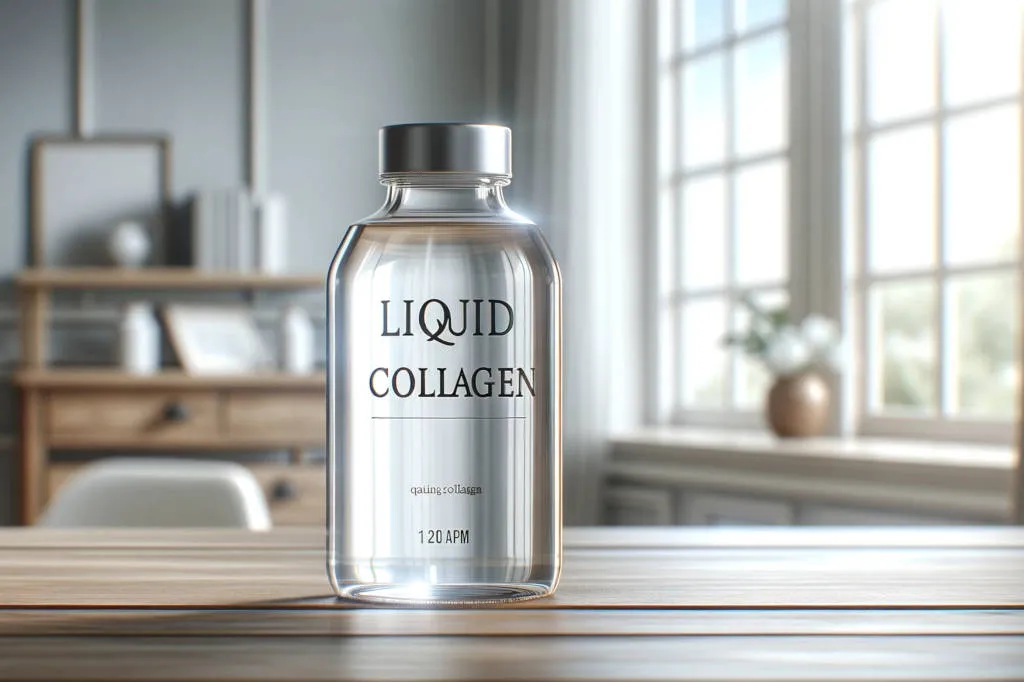
Pros of Liquid Collagen:
- Quick Absorption: One of the main benefits of liquid collagen is that it’s believed to be absorbed faster by the body compared to other forms.
- Convenience: Liquid collagen usually comes in pre-measured doses, making it easy to consume without the need for mixing or blending.
- Versatility: It can be consumed on its own or added to beverages without altering the taste significantly.
- Hydration: Many liquid collagen products also contain added hydrating ingredients, which can be beneficial for skin health.
Cons of Liquid Collagen:
- Cost: Liquid collagen tends to be more expensive per serving compared to powder forms.
- Shelf Life: Once opened, liquid collagen products often have a shorter shelf life and might need refrigeration.
- Additives: Some liquid collagen products may contain added sugars, flavors, or preservatives that aren’t present in powder forms.
- Portability: Liquid collagen can be bulkier and heavier to carry around, especially when traveling.
In the debate of liquid collagen and powder, the liquid form certainly presents both appealing advantages and notable disadvantages. The decision ultimately boils down to individual preferences, needs, and priorities.
Powdered Collagen: Pros and Cons
As the beauty and health sectors acknowledge the importance of collagen, powdered collagen has established itself as a favorite for many consumers. But what makes it stand out, and are there any downsides? Let’s dive into the pros and cons of powdered collagen in the context of the liquid collagen vs powder debate.
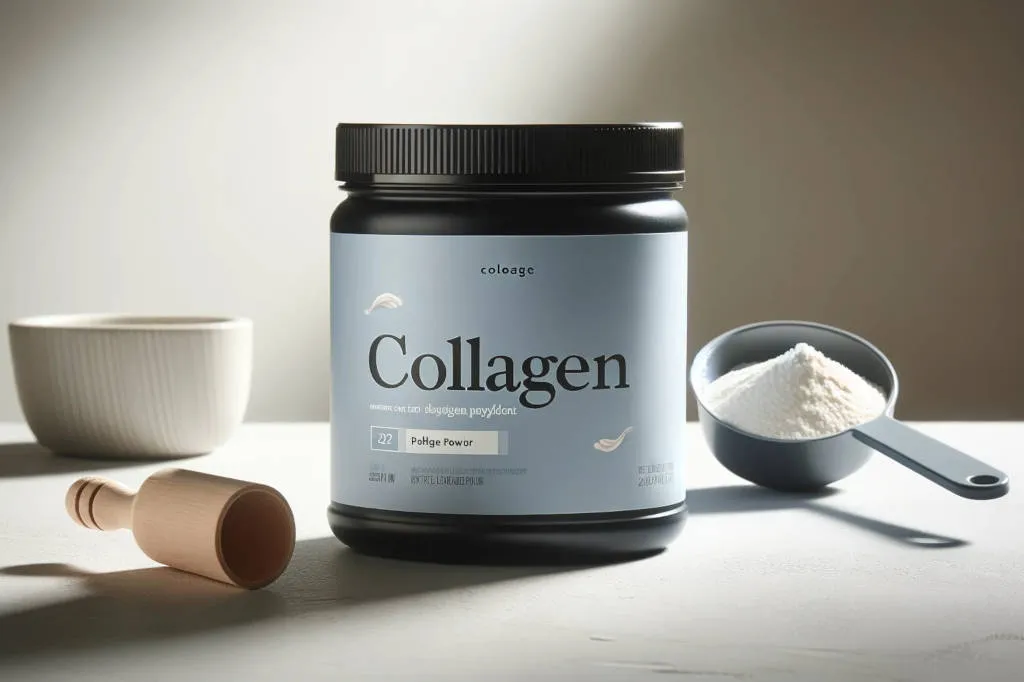
Pros of Powdered Collagen:
- Cost-Efficient: On a per-serving basis, powdered collagen often offers a more budget-friendly option compared to its liquid counterparts.
- Versatility in Use: The neutral flavor of most powdered collagen products allows them to be mixed into a variety of foods and drinks – from smoothies to baked goods.
- Longer Shelf Life: Once opened, many powdered collagen products tend to have a longer shelf life than liquid versions, with no need for refrigeration.
- Minimal Additives: Many powdered collagen supplements boast a clean ingredient list with fewer additives, colors, or artificial flavors.
Cons of Powdered Collagen:
- Preparation Required: Unlike liquid collagen, which is ready-to-consume, powdered collagen needs to be mixed or blended, adding an extra step to the process.
- Solubility Issues: Some powdered collagen products may not dissolve easily, leading to a gritty texture in certain beverages.
- Taste: While many brands offer flavorless options, some users might still detect a slight aftertaste depending on what the powder is mixed with.
- Portion Control: Users need to measure out the correct dosage, which may not always be convenient.
Powdered collagen offers unique benefits and certain challenges. Deciding between the two forms is a matter of personal preference, lifestyle, and specific health goals.
Absorption and Bioavailability
When deciding between liquid collagen vs powder, one pivotal aspect to consider is how effectively the body can absorb and use the collagen. This concept is known as bioavailability. Understanding the absorption rates and overall bioavailability of both forms can make a difference in your decision-making process.

Liquid Collagen Absorption:
- Rapid Absorption: Liquid supplements, in general, tend to be absorbed more quickly than powders. The pre-dissolved nature of liquid collagen allows it to be swiftly taken up by the digestive system.
- Higher Bioavailability: Several studies suggest that liquid collagen may have a slightly higher bioavailability. This means that a greater proportion of collagen is absorbed and utilized by the body when consumed in liquid form.
Powdered Collagen Absorption:
- Dependent on Solubility: The absorption of powdered collagen can hinge on its solubility. If it doesn’t dissolve well, the body might not absorb it as effectively.
- Variable Rates: The absorption rate for powdered collagen can vary depending on what it’s mixed with. Some foods and liquids can either enhance or inhibit collagen absorption.
Factors Impacting Bioavailability:
- Molecular Size: Hydrolyzed collagen, whether in liquid or powder form, usually has higher bioavailability because its molecules are smaller and easier for the body to absorb.
- Presence of Other Nutrients: Certain vitamins, like Vitamin C, can boost collagen absorption. Conversely, taking collagen with foods that inhibit its absorption can reduce its effectiveness.
- Digestive Health: An individual’s digestive health can play a role in collagen absorption. A healthy gut can absorb nutrients more efficiently than an unhealthy one.
Concerning absorption and bioavailability, both forms have their merits. However, individual factors, like digestive health and what you mix your collagen with, can tip the scales in favor of one form over the other. It’s crucial to consider these aspects when making an informed decision.
Taste, Texture, and Convenience
In the discussion about liquid collagen vs powder, the aspects of taste, texture, and convenience often come into play. While the health benefits of collagen are paramount, it’s equally essential to consider these more practical concerns. Let’s delve into how both forms fare on these fronts.

Liquid Collagen:
- Taste: Liquid collagen often comes in flavored varieties, from fruit-infused options to those mixed with herbs. For those who don’t favor the natural taste of collagen, these flavored options can be a blessing. However, some may find certain formulations overly sweet or artificial.
- Texture: Being in liquid form, this type of collagen is smooth and easy to swallow. It’s an excellent option for those who dislike grainy or powdery textures in their drinks.
- Convenience: Liquid collagen is often sold in small, ready-to-drink bottles or sachets, making it easy to consume on the go. There’s no need for mixing or blending, which can be a boon for those with busy lifestyles.
Powdered Collagen:
- Taste: Unflavored powdered collagen has a neutral taste, making it versatile for mixing into various foods and drinks. However, some flavored versions are available for those seeking more taste variety. Some users might detect a slight aftertaste, depending on the brand and source of the collagen.
- Texture: When properly dissolved, powdered collagen can be smooth. However, if not mixed well, it can result in a gritty texture, which some people might find off-putting.
- Convenience: Powdered collagen is typically sold in larger tubs or sachets. While it offers the flexibility to adjust serving sizes, it requires the extra step of mixing. This can be less convenient for those looking for a grab-and-go option.
Regarding taste, texture, and convenience, individual preferences play a significant role. While some may prioritize taste, others might be more concerned about texture or the convenience factor. It’s essential to weigh these aspects according to your lifestyle and preferences when deciding between the two forms.
Cost Analysis
When comparing liquid collagen and powder, the cost can be a determining factor for many individuals. Affordability, coupled with perceived value, often plays a pivotal role in the purchasing decision. Here’s a breakdown of the cost-related factors associated with both forms of collagen.

Liquid Collagen:
- Per Serving Cost: On a per-serving basis, liquid collagen often tends to be more expensive than its powdered counterpart. This is primarily because the liquid form might contain other added ingredients, and the packaging for single servings can increase production costs.
- Bulk Purchases: Some brands may offer discounts for purchasing liquid collagen in bulk. However, given its liquid nature, one should also consider the product’s shelf life.
- Specialized Formulations: Liquid collagen products that are fortified with vitamins, minerals, or other beneficial compounds may command a higher price.
Powdered Collagen:
- Per Serving Cost: Powdered collagen typically offers a lower cost per serving, especially when bought in larger quantities. This makes it a popular choice for those on a tighter budget or those consuming it regularly.
- Bulk Purchases: As with the liquid form, discounts might be available for bulk purchases of powdered collagen. Given its dry nature, powdered collagen often boasts a longer shelf life, making bulk buys more feasible.
- Flexibility: The powdered form allows users to adjust the serving size based on their needs, which can potentially result in cost savings.
Overall Comparison:
When it comes to cost-effectiveness, powdered collagen usually has the edge over liquid collagen on a per-serving basis. However, the final decision should factor in personal preferences, the perceived benefits of additional ingredients in liquid formulations, and convenience.
In the cost analysis of collagen, it’s essential to look beyond just the price tag. Consideration of factors like convenience, personal dosage preferences, and any added ingredients will ensure that you get the most value for your money.
Applications and Uses
When evaluating liquid and powder collagen, understanding their versatile applications and uses can guide individuals to choose the most suitable form for their needs. Both types of collagen offer a myriad of benefits, but their form might make one more appealing than the other in certain situations.

Liquid Collagen:
- Ready-to-Drink: One of the primary benefits of liquid collagen is its ready-to-drink nature. It requires no preparation, making it ideal for those with busy lifestyles or those seeking a quick collagen boost on-the-go.
- Mixed Beverages: While it’s ready-to-drink, some users mix liquid collagen with their morning coffee, smoothies, or juices to enhance flavor or nutritional content.
- Topical Use: Some liquid collagen products are designed for topical application, beneficial for direct skin treatments.
Powdered Collagen:
- Versatile Cooking Ingredient: Powdered collagen is tasteless and odorless, making it a perfect additive to a variety of recipes. From baking to soups, the powdered form can easily be incorporated into daily meals.
- Drink Mixes: Much like its liquid counterpart, powdered collagen can be mixed with various beverages, whether it’s a protein shake, tea, or a glass of water.
- DIY Beauty Treatments: Being in powdered form, it’s commonly used in DIY facial masks, hair treatments, and other beauty concoctions.
Specialized Applications:
- Health and Fitness: Athletes and fitness enthusiasts might prefer a specific form based on ease of use or absorption rates, making the choice of liquid or powder essential for their regimen.
- Beauty Regimens: Those focusing on beauty and skincare might have a preference based on the product’s texture, ease of application, or other added ingredients beneficial for the skin.
In the debate between liquid and powder collagen, the applications and uses play a crucial role in the decision-making process. Depending on one’s lifestyle, dietary habits, and specific needs, either form can be the perfect fit. The key is to assess personal requirements and choose the collagen form that aligns best with daily routines and goals.
Safety and Side Effects
When incorporating any supplement into one’s regimen, understanding potential safety concerns and side effects is essential. In the debate surrounding liquid collagen vs powder, the safety profiles of both forms are generally similar, but some nuances are worth noting.

General Safety of Collagen Supplements:
- Source Matters: Both liquid and powdered collagen are derived from various sources like bovine, marine, or chicken. It’s crucial to ensure that the product you choose is sourced from healthy, contaminant-free environments to reduce the risk of impurities.
- Allergic Reactions: Some people may have allergies to the source of the collagen, be it fish, beef, or chicken. Always check the source and ensure you’re not allergic to it before consuming.
- Digestive Upset: A small percentage of individuals might experience digestive discomfort after consuming collagen, such as bloating or a feeling of fullness.
Liquid Collagen:
- Preservatives: As liquid collagen is a ready-to-drink product, it may contain preservatives to extend its shelf life. Always check the ingredient list for any additives that you might be sensitive to.
- Taste and Texture: Some people might find the taste or texture of certain liquid collagen products off-putting, which could lead to nausea or aversion.
Powdered Collagen:
- Mixing Issues: If not mixed properly, powdered collagen can form lumps, which might cause choking hazards or digestive discomfort.
- Flavorless Variants: While many powdered collagen supplements are flavorless, some might have a slight taste that could be unappealing to some.
Recommendations for Safe Consumption:
- Start Slowly: If you’re new to collagen supplementation, begin with a smaller dose to see how your body reacts, and then gradually increase the amount.
- Consult a Healthcare Professional: Before starting any new supplement, including collagen, always consult with a healthcare professional, especially if you have existing health conditions or are on medication.
Both forms are generally safe for consumption. However, it’s essential to remain informed about potential side effects and always prioritize safety by choosing high-quality products and being aware of any personal allergies or sensitivities.
Environmental and Packaging Considerations
In the modern age, sustainability and environmental impact are paramount concerns for many consumers. As you weigh the merits of liquid collagen and powder, it’s important to also evaluate the environmental footprint of each option, primarily driven by their packaging choices.
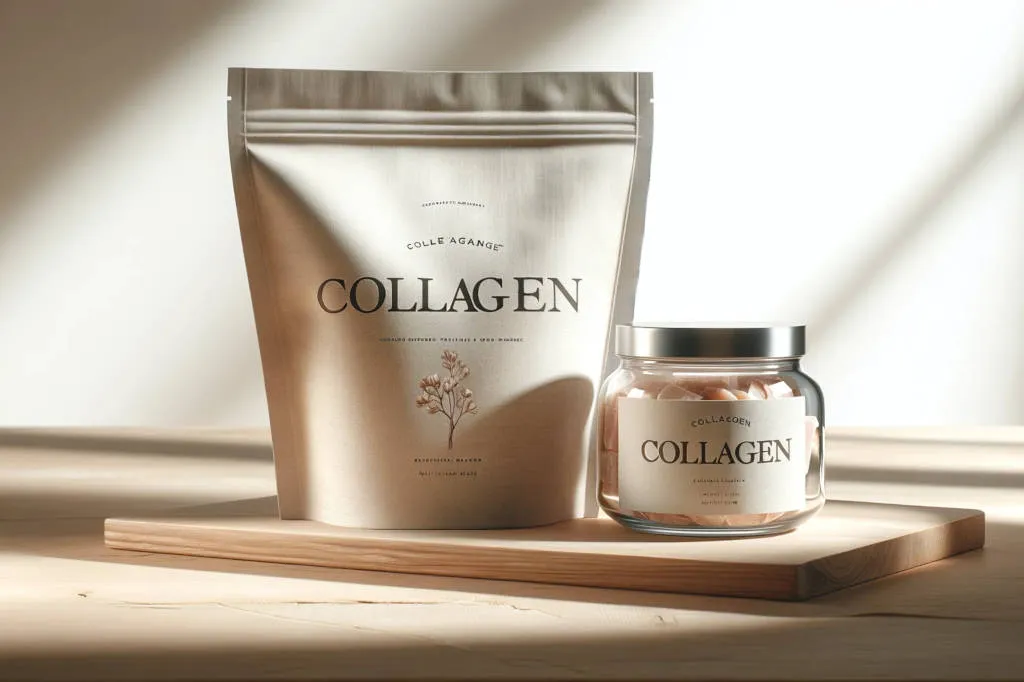
Liquid Collagen Packaging:
- Bottles and Vials: Liquid collagen often comes in bottles, vials, or sachets. These containers, typically made of plastic, might not always be recyclable, depending on your local recycling facilities.
- Shipping Weight: Since liquid collagen contains water, its shipping weight is higher than powdered collagen. This could lead to increased carbon emissions if transported over long distances.
- Storage: Some liquid collagen products require refrigeration, leading to energy consumption over time.
Powdered Collagen Packaging:
- Resealable Bags or Tubs: Powdered collagen is frequently packaged in resealable bags or tubs. These containers are often made of mixed materials, making recycling a challenge in certain areas.
- Lightweight: As it’s a dry product, powdered collagen is lighter, which can reduce carbon emissions during transportation.
- Compactness: Powdered forms tend to be more compact, which means they take up less space during shipping, reducing the environmental impact of transportation.
Environmental Recommendations:
- Recyclability: Regardless of whether you opt for liquid or powdered collagen, look for products with recyclable packaging or brands that have a take-back or refill program.
- Local Sourcing: To reduce transportation emissions, consider purchasing collagen products sourced and manufactured close to your location.
- Bulk Buying: If you consume collagen regularly, consider buying in bulk. This reduces the frequency of deliveries and the associated environmental impact.
When considering liquid vs powder from an environmental standpoint, both have their pros and cons. It’s essential to make informed choices based not only on personal needs but also on the broader implications for the planet. Making efforts to minimize waste, support sustainable practices, and reduce carbon footprints can make a significant difference in the long run.
Top Brands and Products: Liquid Collagen vs Powder
When diving into the world of collagen supplementation, choosing the right brand and product can be overwhelming. Here, we’ll provide a rundown of some of the top brands and their offerings in both liquid collagen and powder categories.
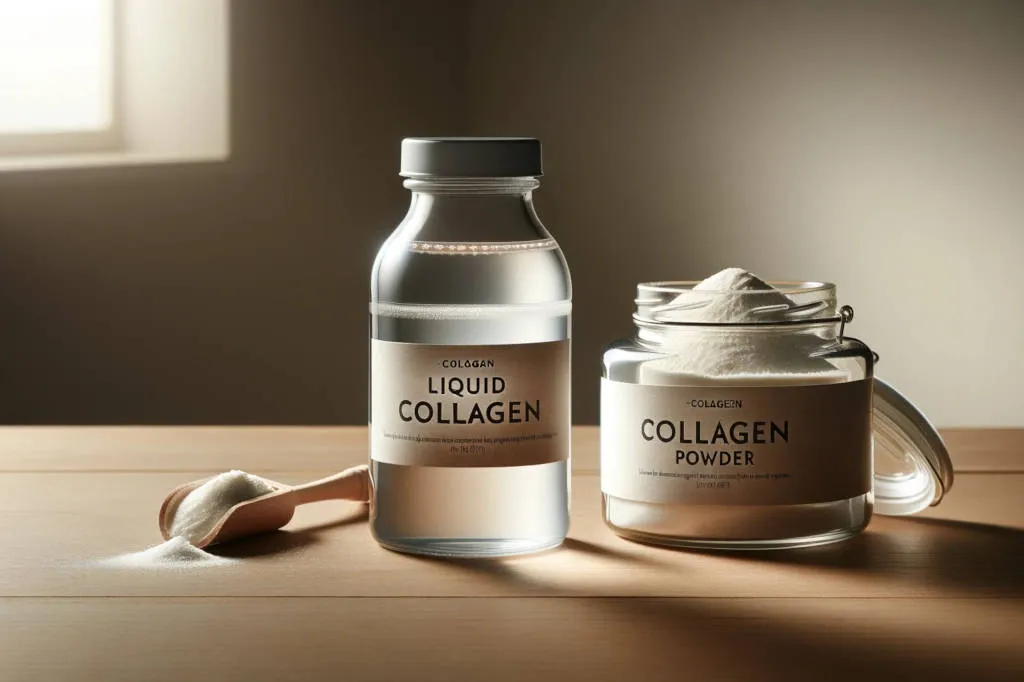
Liquid Collagen Brands:
- Vital Proteins:
• Product Name: Collagen Beauty Glow
• Description: This liquid collagen product contains a blend of marine-based collagen, hyaluronic acid, and vitamin C. It’s known for supporting hair, skin, and nail health. - NeoCell:
• Product Name: Liquid Collagen + Hyaluronic Acid
• Description: A potent liquid formula that combines collagen with hyaluronic acid for joint and skin support. - Applied Nutrition:
• Product Name: Liquid Collagen Skin Revitalization
• Description: A comprehensive formula that blends collagen with beauty-enhancing nutrients to hydrate and nourish the skin.
Powdered Collagen Brands:
- Ancient Nutrition:
• Product Name: Multi Collagen Protein Powder
• Description: This powder includes a blend of bovine, chicken, fish, and eggshell collagen peptides and supports skin elasticity and joint health. - Sports Research:
• Product Name: Collagen Peptides Powder
• Description: Derived from grass-fed, pasture-raised bovines, this powder is known for its purity and bioavailability. - Garden of Life:
• Product Name: Grass Fed Collagen Beauty Powder
• Description: A powdered formula designed to support radiant skin and strong nails, it contains a unique blend of bovine collagen, biotin, and silica.
Note to Readers: It’s crucial to do your own research and, if necessary, consult a healthcare professional before starting any collagen supplement. Individual needs and responses can vary, and what works best for one person might not be ideal for another.
When comparing liquid vs powder, both forms have reputable brands offering quality products. Your choice will largely come down to personal preferences regarding taste, texture, convenience, and specific health goals.
Personalized Needs: Which is Right for You?
Choosing between liquid collagen and powder is not just about weighing the pros and cons, but also understanding which one aligns best with your unique needs and lifestyle. Here’s a guide to help you decide which form of collagen suits you best.

1. Dietary Restrictions & Allergies:
- Liquid Collagen: Most liquid collagen supplements are derived from marine sources, making them a potential allergen for some.
- Powdered Collagen: Available in various sources like bovine, chicken, and marine. You can select the one that fits best with your dietary restrictions.
2. Convenience Factor:
- Liquid Collagen: Ideal for those on-the-go. Simply drink it straight from the bottle or mix it in a beverage.
- Powdered Collagen: Requires mixing with a liquid. However, it’s versatile and can be added to hot or cold drinks, soups, and baked goods.
3. Taste and Texture Preferences:
- Liquid Collagen: Often flavored and might have a smoother texture. Some might find it easier to consume.
- Powdered Collagen: Usually neutral in taste and might have a slight texture depending on the fineness of the powder and the liquid it’s mixed with.
4. Specific Health Goals:
- Liquid Collagen: Might offer higher bioavailability, making it potentially more effective for skin health and anti-aging.
- Powdered Collagen: Often includes a broader range of collagen types, which can be beneficial for joint health, hair, skin, and nails.
5. Storage and Shelf Life:
- Liquid Collagen: Typically requires refrigeration after opening and might have a shorter shelf life.
- Powdered Collagen: Generally has a longer shelf life and doesn’t require refrigeration.
Conclusion:
It’s essential to reflect on your individual needs, preferences, and the specific health goals you’re aiming to achieve. Whether you opt for liquid or powdered form, the key is consistency in consumption to witness potential benefits. Always consult with a healthcare professional when introducing new supplements into your regimen.
Scientific Research and Studies
The debate between liquid collagen and powder doesn’t just stem from personal preferences and marketing claims. It’s vital to look at scientific research and studies to get an evidence-based understanding. This section delves into what science says about the efficacy and benefits of both forms.

1. Absorption and Bioavailability:
- Studies have shown that the molecular size of collagen, irrespective of its form, plays a crucial role in absorption. Hydrolyzed collagen, broken down into smaller peptides, is more easily absorbed by the body.
- It’s worth noting that while some research suggests liquid collagen might be absorbed more rapidly due to its form, both liquid and powdered hydrolyzed collagens have high bioavailability.
2. Efficacy in Skin Health:
- A 2014 study published in the “Journal of Cosmetic Dermatology” found that individuals who consumed collagen, whether in liquid or powder form, experienced improved skin hydration and elasticity. The form didn’t significantly alter the results.
3. Joint Health and Pain Reduction:
- Research from the “Journal of the Science of Food and Agriculture” in 2017 found that collagen supplements, irrespective of their form, helped reduce joint pain in athletes.
4. Effect on Hair and Nails:
- While more research is needed, preliminary studies indicate that collagen’s benefits for hair and nails are not particularly influenced by its form but rather its consistent intake and dosage.
5. Digestive Health Benefits:
- Collagen contains amino acids like glycine that can promote gut health. A study from “Nutrients” in 2017 noted that the benefits to the digestive system were present regardless of whether participants consumed liquid or powdered collagen.
Conclusion:
Scientific research and studies on the topic of liquid and powder collagen underscore that both forms, when hydrolyzed, offer similar benefits. The choice between the two often comes down to individual preferences, convenience, and specific health goals. Always make informed decisions based on both scientific evidence and your body’s unique needs.
Misconceptions and Myths
In the wellness and beauty industry, there’s no shortage of misconceptions, especially when it comes to products that promise rejuvenation and health benefits. Both liquid collagen and powder forms are surrounded by myths. Let’s clear the air and address some of these common misconceptions.
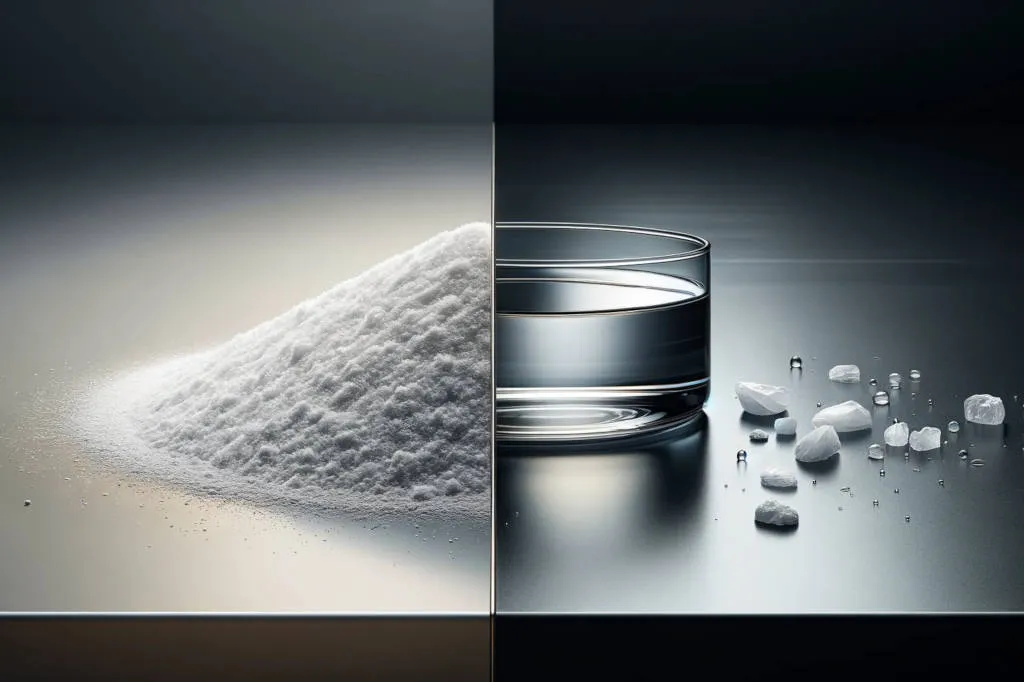
1. Liquid Collagen is Always Superior:
- One widespread myth is that liquid collagen is inherently superior in terms of absorption. While it’s true that liquid forms can be absorbed rapidly, the efficacy largely depends on the collagen’s molecular size. Both liquid and powder forms can be hydrolyzed for better absorption.
2. Powdered Collagen is Just Ground-Up Bones:
- Some believe that powdered collagen is simply ground-up bones. In reality, collagen powder is derived from various sources, including fish, bovine, or marine origins, and undergoes a thorough process to ensure purity and efficacy.
3. All Collagen Supplements are Created Equal:
- Just because two products are labeled as “collagen” doesn’t mean they offer the same benefits. Factors like sourcing, processing, and additional ingredients play a vital role in a product’s effectiveness.
4. Collagen Supplements Can Replace a Balanced Diet:
- While collagen supplements can offer numerous benefits, they shouldn’t replace a balanced diet. Natural collagen production is best supported by a nutrient-rich diet combined with supplements.
5. You’ll See Results Overnight:
- Some think that consuming collagen, be it in liquid or powder form, will offer instant results. The truth is that consistent use over weeks to months is typically needed to observe noticeable changes.
6. Only Women Benefit from Collagen Supplements:
- Collagen is beneficial for everyone, regardless of gender. Both men and women can experience the benefits of improved skin, hair, nails, and joint health.
Navigating the world of collagen supplements, especially when weighing liquid vs powder, can be challenging due to the many myths surrounding them. Being informed and recognizing these misconceptions can help you make better choices for your health and beauty needs. Always prioritize quality, authenticity, and your unique requirements when selecting a collagen supplement.
Conclusion: Liquid vs Powder – Making an Informed Decision
The debate between liquid collagen and powder isn’t just about convenience or taste; it encompasses factors like absorption, cost, environmental implications, and individual needs. While both forms have their unique advantages, neither is categorically superior to the other. The decision boils down to personal preference, lifestyle, and specific health goals.
Navigating the intricate world of collagen supplements might seem daunting, especially with contrasting opinions and myths clouding the narrative. However, equipped with the knowledge from this guide, you’re now in a better position to make an informed choice that aligns with your objectives. Remember to always consult with a healthcare professional before starting any supplement, and listen to your body’s signals to find the best fit for you. Whether you opt for liquid or powder, the consistent and mindful inclusion of collagen in your routine can pave the way for improved overall well-being.
Additionally, you’re invited to explore our collection of articles:





